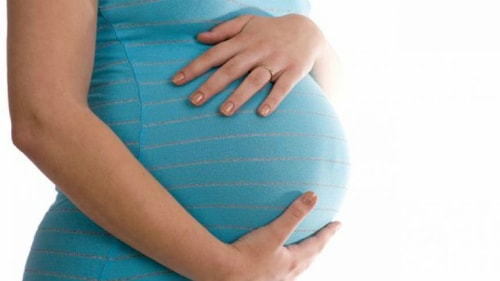10 symptoms pregnant women need to pay attention to
During pregnancy, you may feel Braxton Hicks contractions. They are different from labor pains in that they are painless and occur less frequently.
Your body goes through a lot of changes during the nine months of pregnancy. When you have strange feelings in your belly, pain in your legs… you may start to worry. Take a deep breath. Most pregnant women are healthy and give birth to healthy babies. However, it is important to monitor and know the unusual symptoms so that you can see a doctor when necessary.
1. Spotting and bleeding
“Anytime you have bleeding during pregnancy, you need to know the cause,” says Dr. Francis Chang, an obstetrician-gynecologist at Good Samaritan Hospital in Los Angeles, California.
During the first eight weeks of pregnancy, spotting is a normal sign, as the embryo implants in the uterus. Spotting can also be from a vaginal tear, from recent sexual intercourse, or a cervical infection - these problems are not harmful to the baby.
If you have spotting and pain, you may have an ectopic pregnancy. Bleeding can also indicate that your cervix is contracting or dilating, that you have had a miscarriage, or that you have placenta previa. If you experience any of these problems, you should call your doctor right away.
 |
| Photo: foxnews. |
2. Contractions
Many expectant mothers worry when they first experience Braxton Hicks contractions, which, unlike labor pains, are painless and infrequent, says Dr. James Bernasko, an obstetrician-gynecologist at Stony Brook University Hospital in New York. Braxton Hicks contractions can occur in the second trimester, but are more common in the third. If you're dehydrated, you may also experience them.
Contractions before 24 weeks can also mean you have a urinary tract or yeast infection. If the contractions are painful or frequent, call your doctor.
3. Baby's movements slow down or stop
Between 17 and 18 weeks, you'll start to feel your baby move, although it may just feel like a flutter. Your baby's movements (and kicks) will become stronger, and around 24 weeks, you may notice that your baby is quieter during the day and more active at night.
If your baby's movements slow down, try drinking a glass of ice water or orange juice. "A sudden change in temperature or a spike in sugar will make the baby move," says Chang.
If your baby moves less than usual, call your doctor.
4. Leg pain
Pregnancy increases your risk of deep vein thrombosis, a potentially life-threatening condition that causes blood clots. Increased progesterone causes the veins in your legs to widen, and increased blood supply can slow blood flow to your legs. If you have pain in your calves, call your doctor.
5. Depression
Between 14 and 23 percent of women experience depression during pregnancy, according to the American College of Obstetricians and Gynecologists. If you have depression during pregnancy, you're at higher risk for postpartum depression. Talk to a mental health professional.
6. Edema
About 70 to 80 percent of women experience swelling in their feet, legs, face, and hands during pregnancy. If you also have high blood pressure or headaches, you may have pregnancy-related hypertension.
7. Vaginal discharge
Increased discharge during pregnancy is normal, but if it's accompanied by blood, or you experience pain, tell your doctor. In the second trimester, these symptoms could mean your cervix is dilating, which could cause a miscarriage.
8. Chills and fever
“Any fever and pain needs to be carefully monitored,” says Bernasko. Depending on where the pain is, you could have a kidney infection, or pneumonia, all of which are very serious during pregnancy.
9. Headache
Headaches are very common during pregnancy, often due to dramatic hormonal changes and increased blood volume in the body. Lack of sleep, stress or cutting down on caffeine can make headaches worse.
Headaches are usually nothing to worry about, but headaches in the second or third trimester can be a sign of preeclampsia, says Bernasko.
10. Shortness of breath
The increase in progesterone and your growing belly can make you feel short of breath. This is completely normal, but in rare cases it can be a symptom of a pulmonary embolism, heart or lung disease. Talk to your doctor if you are worried.
According to VnExpress






